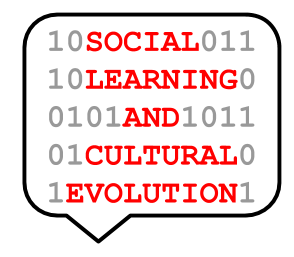Invited Talk 1 (Session 1)
Eva Reindl
Research Fellow - School of Psychology and Neuroscience, University of St Andrews (UK)
Talk Title:
"The Zone of Latent Solutions and its Role for Cultural Evolution"
Description:
The Zone of Latent Solutions (ZLS) hypothesis is the to date most parsimonious approach for explaining non-human cultures, distinguishing them clearly from modern human culture. Much of modern human culture is cumulative (and often also open-ended): i.e., cultural traits are transmitted – wholly or at least partially – via observation learning (or “copying”) of the trait form (e.g., action sequences). This can lead to the emergence of culture-dependent traits (e.g., how to make a fishing net), i.e., traits that cannot be invented by a single individual by themselves anymore, but which require copying variants of social learning. In contrast, the ZLS hypothesis suggests that most (if not all) cultural traits of non-human great apes (henceforth great apes; e.g., nut-cracking with stone hammers) do not rely on this know-how copying: their traits are not culture-dependent, but latent solutions. The form of their cultural traits are not copied, but re-innovated individually, with non-copying forms of social learning (e.g., stimulus enhancement) affecting the frequency and spread of the trait in a population. That is, social learning equips great apes with the know-where, know-what, etc. but the know-how is individually learned. While humans also have a ZLS, modern human culture is special because humans’ copying social learning allows them to go beyond their ZLS. Great apes are limited to ZLS variants of culture. However, the ZLS hypothesis shows that ZLS-only cultures can lead to rich cultural patterns as those observed in great apes, without the cognitive requirement for form/action/know-how copying.
Talk Schedule:
16:00 - 16:15 (CEST)
Panel Discussion:
Session 1 Panel, 16:30 - 17:00 (CEST)
Invited Talk 2 (Session 1)
James Winters
Assistant Professor - School of Collective Intelligence, Mohammed VI Polytechnic University (Morocco)
Talk Title:
"Why is open-ended cumulative culture rare?"
Description:
Modern human culture is seemingly unparalleled in its cumulative and open-ended problem solving capabilities. Over the last 60,000 years, we went from a species which relied on stone tools and lived in small groups to one that builds microprocessors and occupies cities. What explains this zoologically atypical ability? In my talk, I will present findings from a novel computational model, called bitw0r1d, wherein the dynamics of problem solving unfold over two general processes: solution optimization (where novel cultural solutions are generated and refined towards solving specific problems) and problem discovery (where existing cultural solutions are co-opted and repurposed to open up novel problem solving opportunities). Using this model, I will first argue that open-ended cumulative culture is best defined as a process through which populations solve increasingly difficult problems over unboundedly long timescales. Then, I will show that the dynamics of open-ended cumulative culture emerge under a diverse, but restricted set of circumstances. Importantly, even with the right pre-conditions in place, a key insight is that the emergence of open-ended cumulative culture is not an inevitability and is instead subject to path-dependent outcomes. Such findings provide a powerful and parsimonious explanation for the relative paucity of open-ended cumulative culture in human prehistory, without invoking a special set of specific causes.
Talk Schedule:
16:15 - 16:30 (CEST)
Panel Discussion:
Session 1 Panel, 16:30 - 17:00 (CEST)
Invited Talk 3 (Session 2)
Marina Dubova
PhD Student - The Percepts and Concepts Laboratory, Indiana University (USA)
Talk Title:
"Growing Opportunities to Grow: Towards a Model of Open-Ended Communication Learning"
Description:
Humans have developed a great variety of communicative systems without any centralized guidance. Therefore, evolution of human communication is often modeled as distributed learning among many agents which are reinforced for successfully transmitting information to each other. This standard approach demonstrates how decentralized learning can underlie the development of shared communicative systems, but it also faces several fundamental challenges: 1) the agents can only arrive at a small number of communicative conventions, whereas humans managed to successfully agree upon thousands of words; 2) after the agents converge on a set of communicative conventions, they have no incentive to improve or expand it, whereas the evolution of human languages is open-ended. I hypothesize that these two challenges can be addressed by dynamically changing the problem that the agents are learning to solve with communication. I will present the preliminary results of exploring a language evolution model where the agents' communicative problem starts small and gradually increases in difficulty as they agree upon communicative conventions.
Talk Schedule:
18:40 - 18:55 (CEST)
Panel Discussion:
Session 2 Panel, 19:10 - 19:30 (CEST)
Invited Talk 4 (Session 2)
Nicholas Guttenberg
Senior Research Scientist - GoodAI
Talk Title:
"Bootstrapping the emergence of diversifying, self-replicating memes through agent control over selection"
Description:
We investigate the emergence of self-replicating messages in a collection of neural-network-based, communicating, evolving agents. When agents determine each-others' probability of replication based on message content, we find that self-replicating messages quickly emerge. Curiously, these messages do not converge to a fixed point best replicator, but continue to change and even diversify through interactions with agent evolution. In the absence of selective forces we find that a few self-replicating messages still often emerge and compete based on how quickly and accurately they can spread, but lack this property of continual diversification. This suggests a potential mechanism for at least some form of open-ended evolution in the space of ideas.
Talk Schedule:
18:55 - 19:10 (CEST)
Panel Discussion:
Session 2 Panel, 19:10 - 19:30 (CEST)
